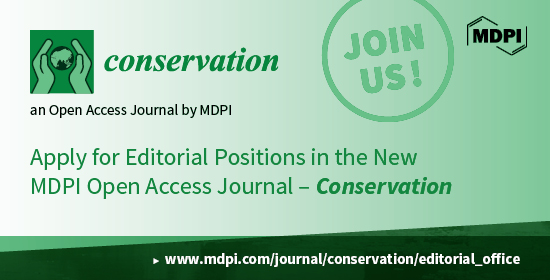
Applications to Join the Topics Editorial Board of Conservation Are Now Open
Applications to join the Topics Editorial Board of Conservation are now open.
We are now accepting applications for the Topics Editorial Board of Conservation, an international peer-reviewed, multidisciplinary, scholarly, electronic open-access journal. It provides a premium forum for both empirical and theoretical research that has significant implications for conservation in both natural and social sciences, and to explore the multiple links between human society and nature, especially (but not limited to) the following areas:
- Biodiversity and environment conservation;
- Resource recycling, conservation, and sustainable management;
- Conservation planning and governance;
- Conservation ethics and ecology;
- Creative and multidisciplinary solutions for conservation and restoration;
- Heritage conservation and restoration.
We welcome all distinguished scholars—across all fields—who contribute to the advancement of conservation practices and the science behind them. We are devoted to providing a global forum for practitioners and scholars to disseminate their research to all intended audiences and further contribute to the biological, sociological, ethical, economic, and other transdisciplinary dimensions of conservation.
As a Topics Editorial Board Member, you would be responsible for
- Providing guidance for Conservation’s topic selection and collection, especially in the initial phase as well as in the long term;
- Promoting relevant Topical Collections, Special Issues, or the journal Conservation within networks on social media, personal websites, relevant networks, and any attended conferences when it is possible;
Our current topical collections include but are not limited to the following:
- Interdisciplinary frontiers of conservation:
- Frontiers in urban ecological design and conservation planning;
- Multidisciplinary solutions for conservation and restoration: linking theory to conservation practice;
- Social-ecological conservation: community conservation from concept to practice;
- Integrated perspectives on conservation planning and governance;
- Looking beyond the scene: exploring community-based conservation resolutions;
- Hydrological ecology and stream diversity: lens of conservation;
- Climate change adaptation for global conservation;
- Planning conservation areas, optimal site selection;
- Digital processes in social, cultural, and ecological conservation.
- Prevalent focuses:
- Coastal and marine ecosystem conservation;
- Heritage conservation and restoration;
- Indigenous knowledge and biodiversity conservation;
- Conservation for plant diversity and agricultural landscape;
- Species, biodiversity, and habitat management;
- Biodiversity conservation of plant genetic resources;
- Mammalian responses to climate change adaptation;
- Plant community and ecological restoration;
- Land conservation: conserve, redevelop, and un-develop;
- National parks, protected areas, and wilderness.
If you are interested in this position or have any potential candidates for recommendation, please contact the Conservation Editorial Office at conservation@mdpi.com.
